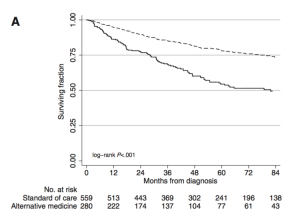Aug 17 2017
Alternative Medicine Kills
 I find it ironic that proponents of alternative medicine often accuse their critics (including yours truly) of not caring about patients. They try to take the moral high ground, claiming they are just trying to help people anyway they can.
I find it ironic that proponents of alternative medicine often accuse their critics (including yours truly) of not caring about patients. They try to take the moral high ground, claiming they are just trying to help people anyway they can.
Of course, this entirely misses the point of the criticism (which is either deliberate or convenient). Proponents of science-based medicine want one thing – the best chance that our treatments are safe and effective. Determining whether a treatment or any medical intervention has more benefit than risk can be very tricky – much more tricky than most non-experts realize. That is precisely why we need the best science available to help us make these critical determinations.
Meanwhile, alternative medicine proponents, it seems to me, fall into two broad camps: those who simply don’t understand the science of medicine, and con-artists. This is actually a continuum, with many people having a combination of naivete and a willingness to cut corners or engage in a little deception. The one thing they don’t have, however, is any legitimate moral high ground. They are either being reckless, despite their intentions, or they are robbing people of their health and money.
For some so-called alternative treatments there is little quality scientific evidence to evaluate claims. For such treatments we can still make judgments based upon plausibility, but such arguments are rarely compelling to the lay public. We also have an extensive history over the last century at least of new possible medical treatments. We know from experience that most new treatments will not turn out to be safe and effective. So, just playing the odds, any new untested implausible treatment is overwhelmingly likely to be either worthless or harmful. But again, people buy lottery tickets.
It is far more compelling when we have solid scientific evidence that a new treatment does not work or is harmful. This is still not enough to eradicate the treatment completely, but does seem to reduce its popularity. But even in the best case scenario, we end up playing whack-a-mole. “New” treatments, most of which are not actually new but just a rebranding with a slight variation of older quack treatments, pop up faster than we can knock them down.
That’s why it can be especially useful to look at alternative medicine collectively. Can we document a difference in outcome between patients who chose science-based medicine vs alternative treatments? A recent study did just that, comparing outcomes for patients with early and treatable cancer who either followed standard care or delayed care because they pursued alternative treatments. David Gorski did a thorough review, including other studies addressing the same question, so I won’t repeat all that here. David summarizes the results:
Not surprisingly, the risk of death was higher for three out of the four cancers. Overall, the hazard ratio (HR) for death was 2.5 (95% confidence interval [CI] 1.88 to 3.27); 5.68 for breast cancer (CI 3.22 to 10.04); 2.17 for lung cancer (CI 1.42 to 3.32); and 4.57 for colorectal cancer (CI 1.66 to 12.61). The differences observed were not significant for prostate cancer, likely because the survival with conventional therapy was so high to begin with. Prostate cancer tends to have a long natural course, and in this study numbers were small and follow-up too short.
Overall if you rely on alternative medicine to treat your cancer your risk of death was increased 2.5 times. For highly treatable cancers like breast cancer risk of death was almost six times higher with alternative medicine. Prior studies showed similar results.
If alternative approaches to cancer were superior, as their proponents claim, they should have superior outcomes. Of course, no single study is perfect or definitive, so they will likely nitpick this to death – anything but admit the blatant reality that forgoing the most effective treatments for magic beans is not a good idea.
These results are not surprising to anyone who understands what is going on. By definition science-based medicine has the best outcomes, because that is the whole point of doing the science. The standard of care is based on using the best evidence to determine what gives the best outcomes. If a so-called alternative treatment could demonstrate better outcomes, it would become standard.
What proponents offer instead of actual evidence is testimonials. This is essentially a form of emotional blackmail. Testimonials are highly misleading, and are essentially worthless as scientific evidence. But they are emotionally compelling, especially to someone who is desperate because they or a loved-one is seriously ill. Proponents also have a lot of excuses – science can’t test our miraculous treatment, scientists are biased against such treatments, Big Pharma something, etc. They also have discovered that they can do crappy studies guaranteed to find the outcomes they want, and then they can cherry pick these studies and ignore the rigorous ones that indicate their treatment doesn’t work.
Meanwhile, (in some cases) they are killing people.






